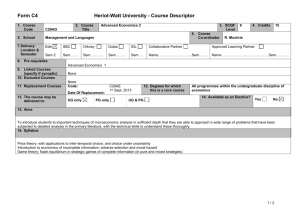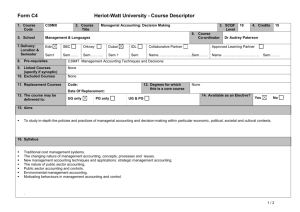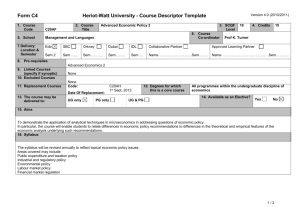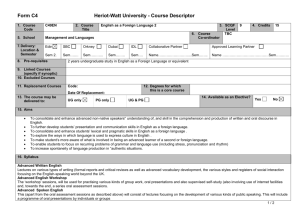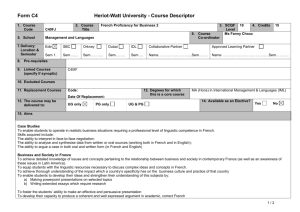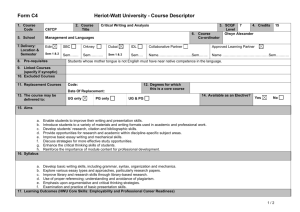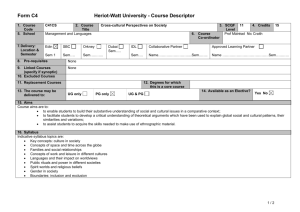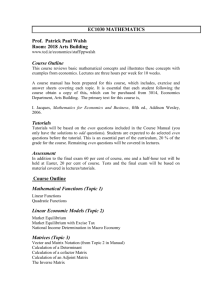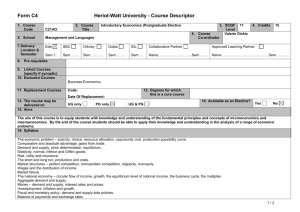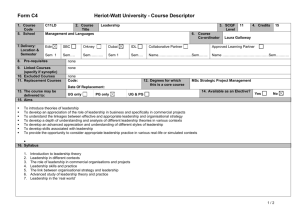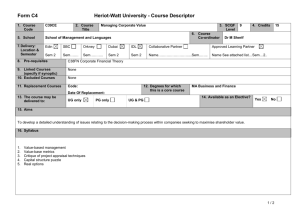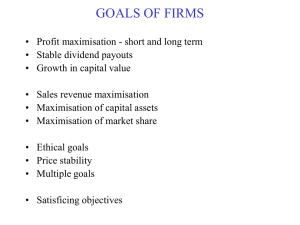C28IN_C4 - Heriot
advertisement
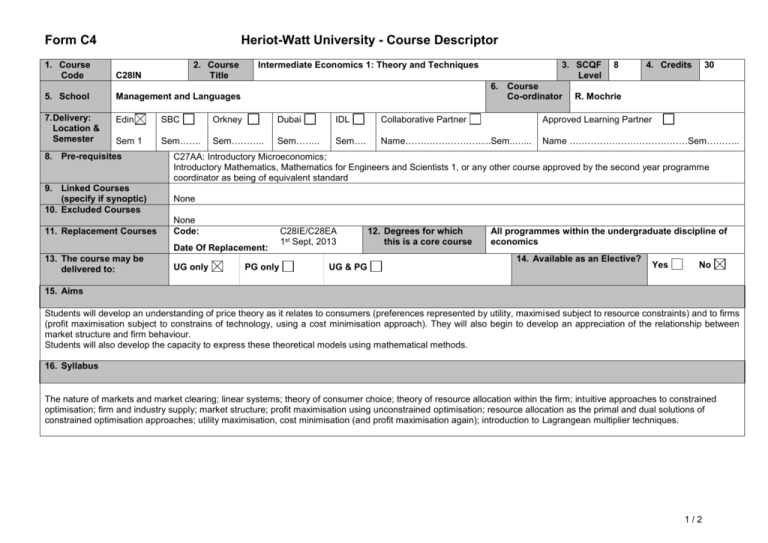
Form C4 Heriot-Watt University - Course Descriptor 1. Course Code C28IN 5. School Management and Languages 7. Delivery: Location & Semester Edin SBC Orkney Dubai IDL Collaborative Partner Approved Learning Partner Sem 1 Sem……. Sem……….. Sem…….. Sem…. Name…………………….....Sem..…... Name …………………………………Sem……….. 8. Pre-requisites 9. Linked Courses (specify if synoptic) 10. Excluded Courses 11. Replacement Courses 2. Course Title Intermediate Economics 1: Theory and Techniques 6. Course Co-ordinator 8 4. Credits 30 R. Mochrie C27AA: Introductory Microeconomics; Introductory Mathematics, Mathematics for Engineers and Scientists 1, or any other course approved by the second year programme coordinator as being of equivalent standard None None Code: Date Of Replacement: 13. The course may be delivered to: 3. SCQF Level UG only PG only C28IE/C28EA 1st Sept, 2013 UG & PG 12. Degrees for which this is a core course All programmes within the undergraduate discipline of economics 14. Available as an Elective? Yes No 15. Aims Students will develop an understanding of price theory as it relates to consumers (preferences represented by utility, maximised subject to resource constraints) and to firms (profit maximisation subject to constrains of technology, using a cost minimisation approach). They will also begin to develop an appreciation of the relationship between market structure and firm behaviour. Students will also develop the capacity to express these theoretical models using mathematical methods. 16. Syllabus The nature of markets and market clearing; linear systems; theory of consumer choice; theory of resource allocation within the firm; intuitive approaches to constrained optimisation; firm and industry supply; market structure; profit maximisation using unconstrained optimisation; resource allocation as the primal and dual solutions of constrained optimisation approaches; utility maximisation, cost minimisation (and profit maximisation again); introduction to Lagrangean multiplier techniques. 1/2 Form C4 Heriot-Watt University - Course Descriptor 17. Learning Outcomes (HWU Core Skills: Employability and Professional Career Readiness) Subject Mastery Understanding, Knowledge and Cognitive Skills Scholarship, Enquiry and Research (Research-Informed Learning) The relationship between scarcity, prices and market clearing Understanding of choice as the outcome of utility maximisation for consumers and profit maximisation for firms. Ability to use differential calculus to solve simple examples of such problems, and hence to comment on welfare effects using comparative statics. Understanding of the value of mathematical techniques in identifying the logical conclusions of economic analysis Understand the principal elements of the theory of the consumer and the theory of the firm. Ability to use microeconomic theory as a basis for interpreting problems of choice that arise in everyday settings Personal Abilities Industrial, Commercial & Professional Practice Autonomy, Accountability & Working with Others Communication, Numeracy & ICT Use standard microeconomic models for consistent analysis of economic problems based on optimisation. Use standard techniques of economic analysis at the level generally required within economic consultancy Solve and describe behaviour of simple economic models, including comparative static analysis of effects of change of exogenous variables Enhanced ability to engage in problem solving within teams Report writing on findings in a form that is understandable by peers. 18. Assessment Methods Method 19. Re-assessment Methods Duration of Exam Weighting (%) Synoptic courses? Method (if applicable) Coursework Examination Duration of Exam Diet(s) (if applicable) 40% None Examination 3 hours 3 hours 20. Date and Version Date of Proposal March, 2013 Date of Approval by School Committee Date of Implementation September, 2013 Version Number 2/2 1
